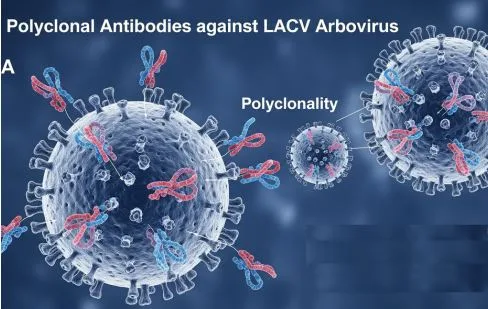How Rabbit La Crosse Virus Nucleocapsid Polyclonal Antibodies Support Arbovirus Research?
Arboviruses, short for arthropod-borne viruses, are a group of pathogens transmitted to humans and other animals via the bite of arthropod vectors, such as mosquitoes, ticks, and sandflies. Common types of arboviruses include Dengue, Zika, Yellow Fever, West Nile, and Chikungunya. These viruses can cause a range of illnesses, ranging from mild flu-like symptoms to severe neurological complications or hemorrhagic fever.
However, arbovirus infections predominantly affect children and can lead to neurological complications, such as seizures, coma, and long-term cognitive impairments.
According to a study conducted from 2003 to 2012, around 1217 cases and 22 deaths were reported due to pediatric neuroinvasive arboviral infection in the US. La Crosse Virus (LACV) was responsible for over half of these cases, 665 in total, followed by 505 cases due to West Nile virus.
What is the La Crosse Virus?
La Crosse Virus is a member of the Bunyaviridae family and the genus Orthobunyavirus. It is a neurotropic virus that can lead to encephalitis, especially in children. That is why accurate detection and characterization of LACV are important to understand how the virus spreads, affects the body, and how outbreaks can be prevented. Here is where Rabbit-derived nucleocapsid polyclonal antibody comes into play.
These antibodies not only improve the sensitivity and specificity of diagnostic assays but also help understand viral-host interactions, which in turn aid in the development of effective vaccines and therapeutic treatments.
How are Rabbit-derived Nucleocapsid Polyclonal Antibodies Generated?
Rabbit La Crosse Virus Nucleocapsid polyclonal antibodies are produced by immunizing the host (rabbit) with purified recombinant La Crosse Virus N protein or inactivated virus particles. The rabbit’s immune system, in response, produces antibodies that recognize and bind to multiple epitopes on the nucleocapsid protein.
After a series of booster injections, sera are collected and purified to produce high-titer polyclonal antibodies.
What is the role of nucleocapsid protein in LACV production?
The nucleocapsid (N) protein of LACV is encoded by the S segment of its tri-segmented RNA genome. It plays an important role in viral replication by encapsulating viral RNA and forming the ribonucleoprotein complex, which is crucial for transcription and replication.
Since the N protein is known for its ability to trigger an immune response and consistent structure across different strains of virus, it is an ideal target for antibody generation. Antibodies produced against this protein help researchers to detect LACV in a wide range of applications.
What are the applications of LACV?
Rabbit-derived LACV nucleocapsid polyclonal antibodies can bind to multiple epitopes of the nucleocapsid proteins. So, they are widely used in various applications that support arbovirus research, including:
Diagnostic tool development
These antibodies are a crucial part of immunoassays, such as ELISA, IFA, and WB, that help detect the presence of LACV antigens in tissue or fluid samples. Their high sensitivity and specificity make them ideal for the early detection of infections and controlling the spread of disease.
Research on Virus-Host Interactions
Knowing how LACV interacts with the host cells can help identify potential therapeutic targets. Polyclonal antibodies specific to the nucleocapsid protein help researchers trace the viral protein’s behavior inside the host cells. Based on the study, the researchers can produce more effective treatments.
Pathogenesis Studies
These antibodies help monitor the progression of infection in vitro and vivo. As a result, scientists can study how LACV spreads within the host and what tissues it targets. This can also help identify why the arthropod-borne viruses specifically cause neurological diseases, especially in children. By this, the researchers can develop targeted interventions and minimize brain damage and other long-term complications.
The Bottom Line
Now that you know what rabbit LACV nucleocapsid polyclonal antibodies are and how they have become an indispensable tool in the ongoing fight against arboviruses, what are you waiting for? Find a reliable supplier of polyclonal antibodies that can support your arbovirus experiment effectively.




